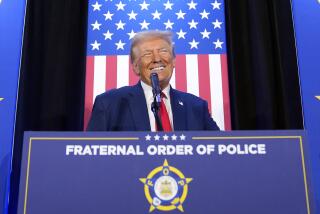Where Was Clinton When It Counted?
- Share via
Behind the backdrop of badges and blue uniforms, there is dissension in the ranks of the Fraternal Order of Police. The national president, Gil Gallegos, pulled a fast one on the rank and file to endorse Bill Clinton. The media played up the fact that this was the first time a Democrat had received the endorsement of the nation’s largest police organization. They failed to mention that it was also the first time the endorsement vote was not sent to the line officers, but voted on by a legislative committee mostly handpicked by Gallegos, a longtime Clinton crony. Even with the deck stacked in his favor, Clinton could garner only a plurality of the 41 votes cast.
Scores of local and state lodges moved quickly to distance themselves from Gallegos and endorse Bob Dole. Why? For street cops, the primary concern is, “Can I trust my partner when my life is on the line?” It is no secret that most Americans do not trust Clinton. Police officers feel no differently. In this administration, uncorroborated testimony by drug dealers counts for more than a cop under oath. From his judicial appointments to his retreat from the war on drugs, this president has turned his back on police officers and on the people they protect.
Actually, the Gallegos endorsement perfectly reflects Clinton’s crime agenda: superficial gestures, politically motivated, with no positive impact. Take a look at Clinton’s favorite crime-fighting weapons: the 1994 omnibus crime bill, the Brady bill and the assault weapons ban. As a former police officer, I can tell you that these do little to address the real problems that police face every day.
Clinton loves to take credit for “winning” the war on crime and points to the cornerstone of the 1994 bill, his supposed 100,000 new police officers. Yet the bill actually provided funding for only 23,000 officers--and only if the local government puts up matching funds. And the federal side of those matching funds lasts only three years. After that, the local taxpayer picks up the entire tab. The likely result in these times is layoffs.
Clinton lauds the Brady bill and assault weapons ban as “common sense anti-crime measures” responsible for the decrease in crime statistics. Depending on the time of day, Clinton administration officials will claim that the Brady bill has kept 60,000 or 100,000 felons from buying guns. But ask how many of these felons have been prosecuted under the provisions of the bill, and they whisper, eight. Either the administration is exaggerating the numbers or the Justice Department has failed abysmally in enforcing the law.
The most seriously flawed aspect of the Brady bill is the waiting period. Proponents say the five-day wait is needed to do a name check. But there is no requirement for a check in the bill. More than 30% of violent felons roam the streets on pretrial release or parole, and criminals don’t limit themselves to buying guns legally. Not taking advantage of instant-check technology puts those of us who obey the law at a deadly disadvantage.
The assault weapons ban is just another in a series of symbols, not an effective means to prevent violent crime. Machine guns and similar rapid-fire arms have been banned since 1936. In 1992, before the assault weapons ban took effect, more people were killed in America with baseball bats than with assault weapons. Because the guns banned were mostly simple rifles altered to resemble military weapons, all but three models are back on the market after slight cosmetic changes.
The solution to our crime problem is not assault weapon bans, five-day waits or invisible cops. Eight percent of the criminals commit nearly 70% of all the crime in America. We must target these predators, vigorously prosecute them and send them to jail till they no longer pose a threat to civilized society. We need more money for prison construction and an end to parole. We need judges who understand whose rights have to be protected.
There is an important role for the federal government in crime control. It starts at the border, with effective drug interdiction and quick deportation of criminal aliens. Virtually all violent crimes are committed under the influence of drugs or are drug-related. Drugs are big business for gangs. The president must put the scourge of drug abuse on the top of the priority list, not No. 29 out of 29 as Clinton has. And the message from the White House to our children must be clear and constant: Drugs are wrong. That’s not the message when a would-be president appears on MTV saying that if he had the chance to do it again, he would inhale.
Restoring the funds he drastically cut for interdiction and the drug czar’s office after teen drug use soared may win Clinton some votes now. But like any cop, I have to ask: Where was Clinton when we needed him?
More to Read
Sign up for Essential California
The most important California stories and recommendations in your inbox every morning.
You may occasionally receive promotional content from the Los Angeles Times.













